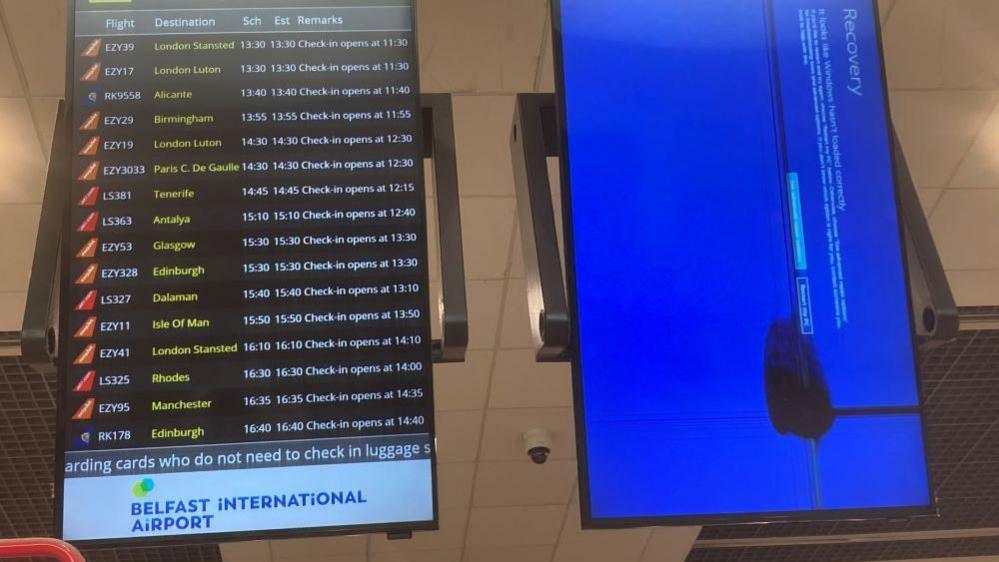'About 60%' of NI GPs impacted by global IT chaos

The Department of Health said some of its systems had been impacted by the outage
- Published
Some hospital and GP systems used by Northern Ireland's health service have been impacted by a major global IT outage.
The Department of Health said some hospital services had been affected such as booking patients into operating theatres and capturing digital endoscopy images.
Out-of-hours GP services have not been affected and will operate as normal over the weekend.
It follows a worldwide issue caused by a software bug.
Other sectors such as banking and airports have also faced disruption.
On Friday, the Department of Health said that about two thirds of GP practices across Northern Ireland had been affected meaning they could not view and update patient records.
They have also not been able to generate routine prescriptions and see laboratory results.
Speaking on BBC Radio Ulster's Evening Extra, Dr Alan Stout said about 60% of GP practices in Northern Ireland had been affected by the outage.
He said: "About half of the population [will have been affected], around 1,000,000 patients, now they are clearly not all going to have been contacting their GP today," he said.
"GPs on average will deal with, across all of Northern Ireland, around 40,000 calls each day, so roughly 20,000 patients who would be contacting their GP today have been impacted and will have noticed the affect," he added.
'There is no need to panic'

Dr Alan Stout says doctors may be reverting to more "old-fashioned methods"
Dr Stout explained that the biggest problem for GPs has been cross referencing patient information and repeat prescriptions, but "in medicine you can revert back to old fashioned methods" of seeing people.
He asked people to be patient.
"There is no need to panic, no need to contact and try to order medication that you don't quite need yet, just be patient and take your time and we hope it will resolve" he added.
In a statement, the department added the issues were not caused by its own technologies but by third party systems.
"All emergency care services will continue to be provided and the public should attend appointments and access services as normal unless advised not to by service providers like their hospital or GP," a spokesperson said.
Earlier, Dr Ursula Mason, chair of the Royal College of Practitioners said that IT outage was causing "causing considerable disruption".

Belfast International Airport said its systems are returning to normal
Northern Ireland's airports have also been impacted by IT problems, although flights have continued.
Belfast International Airport reported longer waiting times and Belfast City Airport advised passengers to check the status of their flights due to the disruption.
At Belfast International, while some flight information screens were frozen, there is no longer any other evidence of disruption.
"The airport is part of a global aviation network that is still experiencing disruption so delays and cancellations can be expected as the day goes on," a spokeswoman for the airport explained.
"Passengers should continue to check with their airline for the latest updates and before travelling to the airport."
'Could be some time'
Belfast City Airport said although flights operations had not been "directly affected" there would be "disruption across global networks".
Dublin Airport said short-haul passengers should aim to arrive two hours before departure and long-haul three hours.
It added it had deployed additional staff in the terminals to help travellers.
The airline Ryanair said it had been "forced to cancel a small number of flights" and has also advised its passengers to arrive three hours before flights.
Dublin Port estate is fully operational again after what it described as some brief traffic congestion earlier.
The number of flights cancelled across the world has risen to 5,078 – 4.6% of those scheduled – according to the latest update from aviation analytics firm Cirium.
In the UK, 167 departures have been cancelled – 5.4% of those scheduled – and 171 arrivals were cancelled, the firm says.
Cyber security firm CrowdStrike said the issues have been caused by a defect in a software update for Windows operating systems.
A fix has been deployed, it added, but it "could be some time" before services are fully restored.
Some banks, shops and media outlets globally have also been impacted.